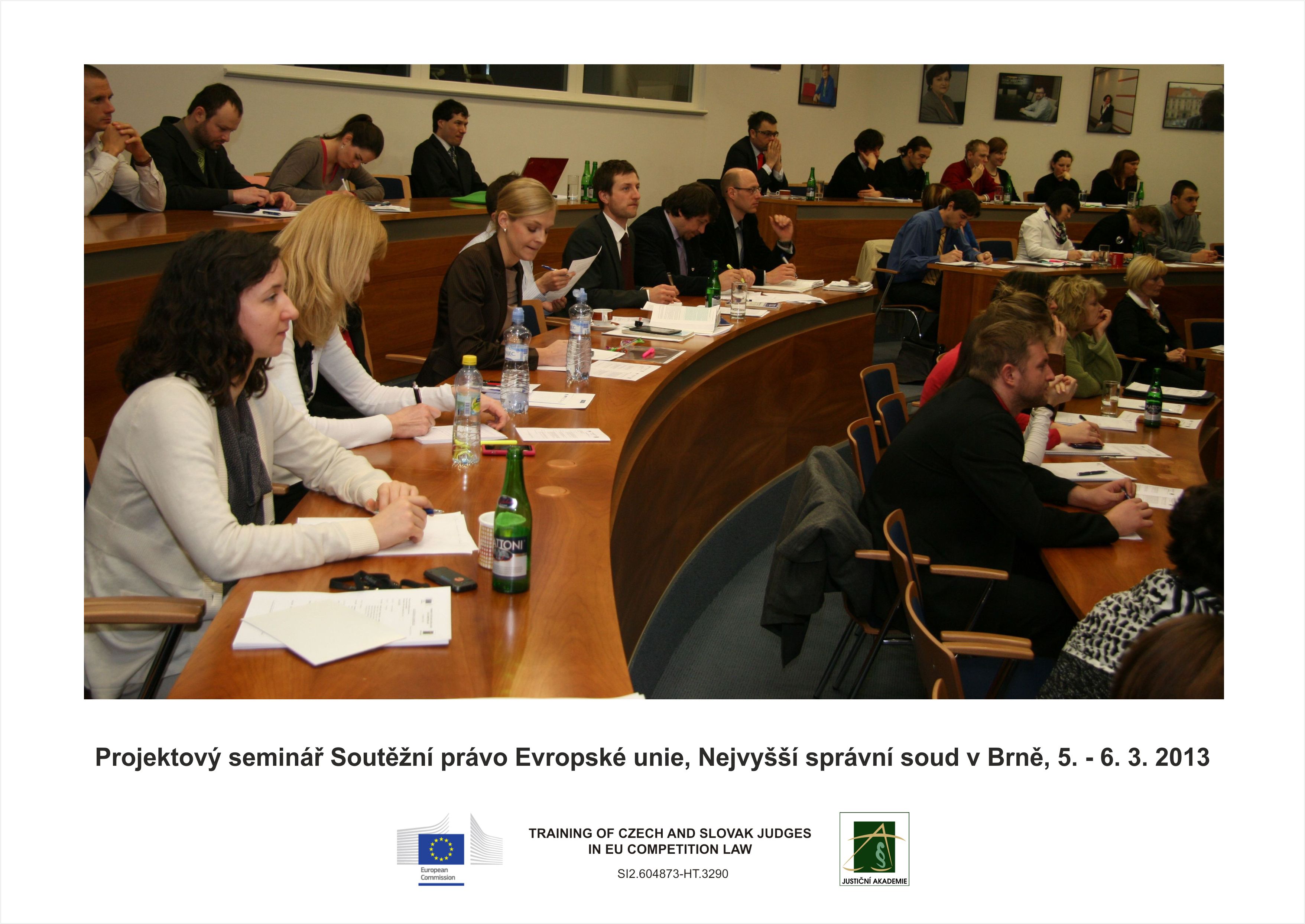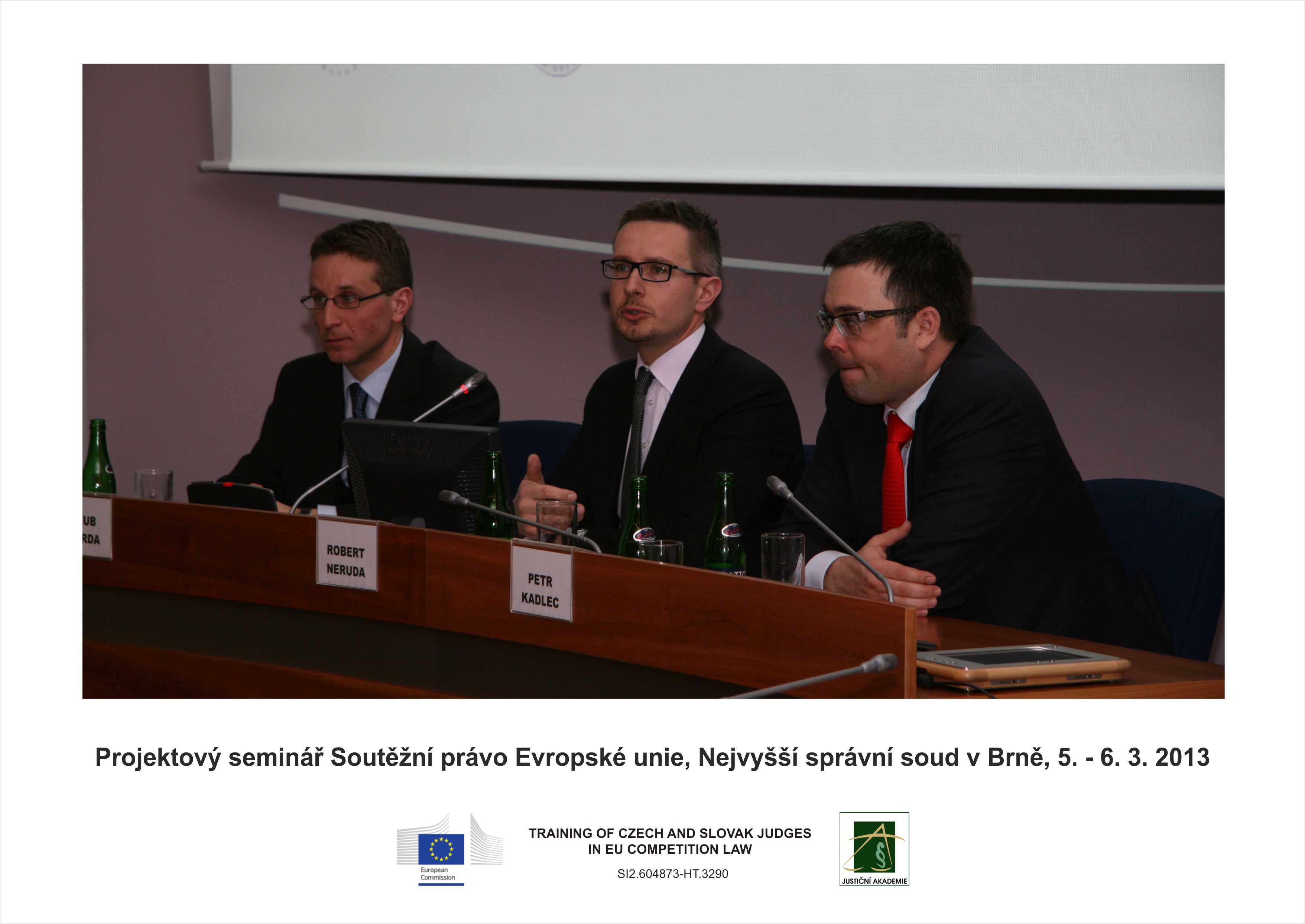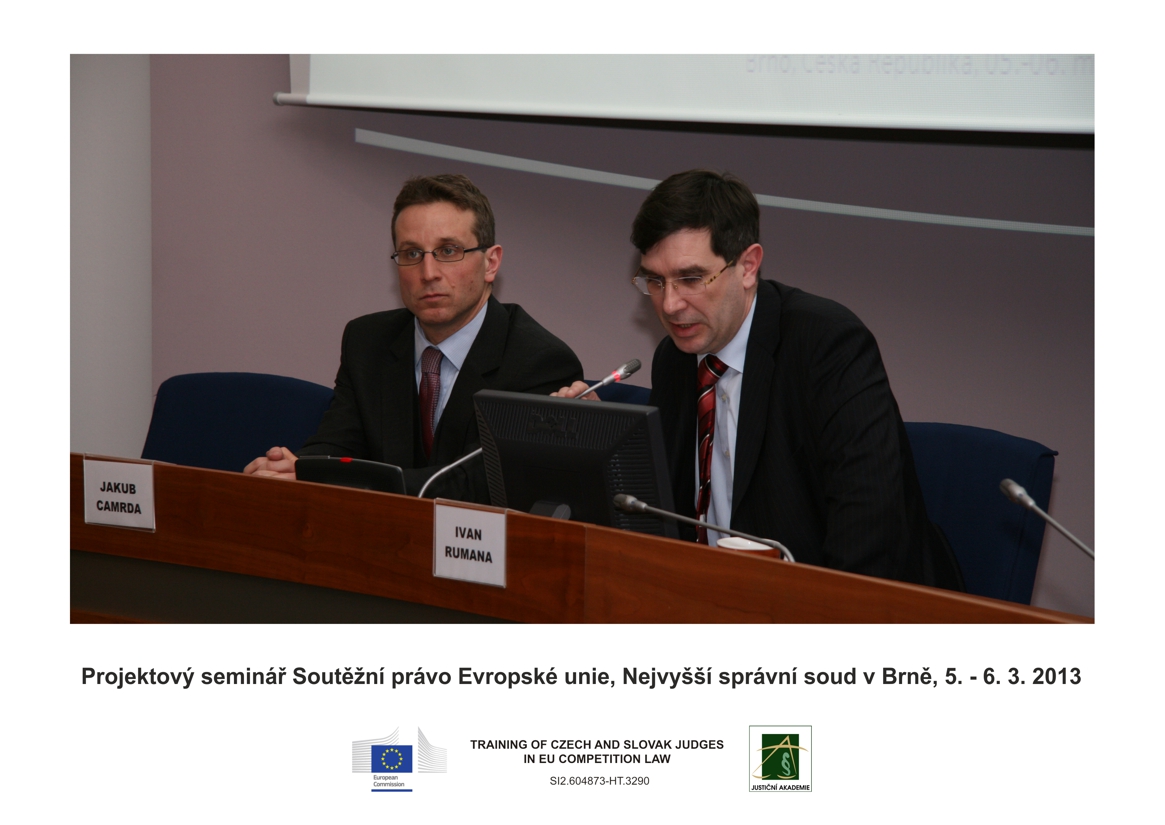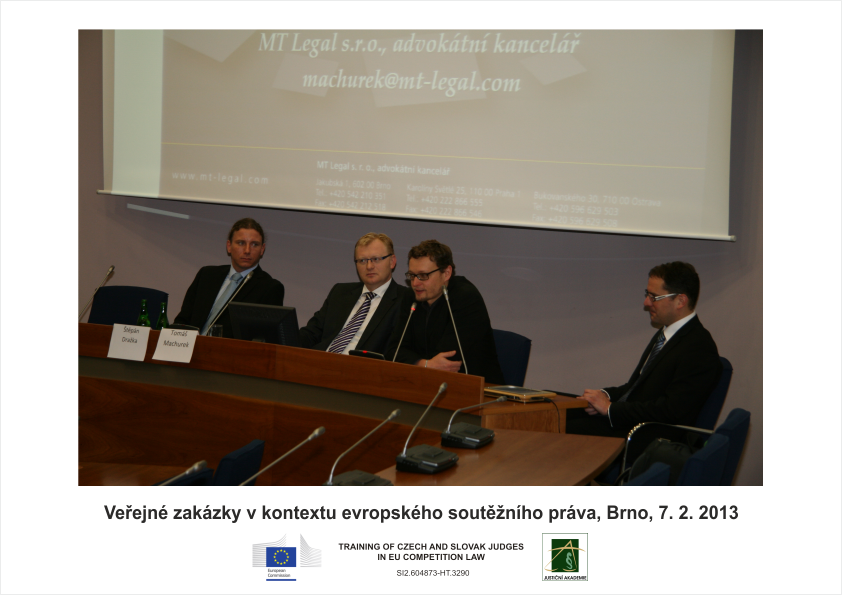Soutěžní právo Evropské unie, Brno, 5. - 6. 3. 2013
{modal url="images/EVROPSKE_SOUTEZ_PRAVO/SOUTEZ_PRAVO_5_6.3.013/1_soutez_pravo.jpg" group="mygallery"} {/modal} {modal url="images/EVROPSKE_SOUTEZ_PRAVO/SOUTEZ_PRAVO_5_6.3.013/2_soutez_pravo.jpg" group="mygallery"}
{/modal} {modal url="images/EVROPSKE_SOUTEZ_PRAVO/SOUTEZ_PRAVO_5_6.3.013/2_soutez_pravo.jpg" group="mygallery"}  {/modal} {modal url="images/EVROPSKE_SOUTEZ_PRAVO/SOUTEZ_PRAVO_5_6.3.013/3_soutez_pravo.jpg" group="mygallery"}
{/modal} {modal url="images/EVROPSKE_SOUTEZ_PRAVO/SOUTEZ_PRAVO_5_6.3.013/3_soutez_pravo.jpg" group="mygallery"}  {/modal}
{/modal}
Veřejné zakázky v kontextu evropského soutěžního práva, Brno, 7.2.2013
{modal url="images/EVROPSKE_SOUTEZ_PRAVO/VEREJNE_ZAKAZKY_7.2.013/1_verejne_zakazky.png" group="mygallery"} {/modal}
{/modal}

BASIC INFO ABOUT THE PROJECT
The Ministry of Justice of the Czech Republic in partnership with the Czech Judicial Academy was the final beneficiary of the project no. CZ0056 “E-learning Education for Judiciary” supported from the 1st Call of the Financial Mechanisms of Norway, Priority 7.3 “Promotion of educational system in the judicial sector”.
The project activities started in 2008 and ended in April 2011, as was planned.
Total grant volume (nominal) was 498,304 EUR, total eligible expenditures were 587,000 EUR.
The beneficiary of the project was the Ministry of Justice, the co-beneficiary was the Judicial Academy.
The main goal of the project was the enhancement of the education of employees of the Czech judiciary with the use of modern technologies. The project responded to the need of a new approach towards continuous training of employees in judiciary.
WHY A PROJECT ON E-LEARNING TRAINING?
- The project was based on a thorough needs analysis of methods preferred by participants of training from the judicial sector and on e-justice concept.
- The project was compatible with modern European trends in adult training.
- The project created the opportunity to combine distance and face-to-face methods of training, and enabled:
- Study anytime from anywhere (for distance part of learning);
- Standardization and deepening of theoretical knowledge;
- Development of practical skills;
- More time for solving cases and related practical issues in face-to-face part of learning;
- Effective training and money savings.
The project was divided into several main stages (preparatory stage, implementation of infrastructure, implementation of study modules, pilot testing, evaluation) and presupposed the achievement of the following indicators:
|
Indicator |
Plan |
|
Number of pilot modules |
10 |
|
Number of trained authors |
20 |
|
Number of study modules |
60 |
|
Number of manuals created for work in electronic system(s) |
3 |
|
Number of participants of electronic training |
1000 |
|
- out of which participants of pilot training |
500 |
|
JA informative website |
1 |
In relation with the results of the pilot testing, thorough needs analysis and the Judicial Academy Training Programme the topics of individual study modules were suggested in a way that it is possible, if needed, to use them for three subsequent levels, namely:
1st level – general (general study modules developed for initial training course for trainees, introductory modules developed for different branches of law; target groups – primarily trainees; also assistants to judge)
2nd level – specific (specific study modules developed for different branches of law; target groups – primarily trainees; also assistants to judge with respect to their specialization)
3rd level – specialized (specialized study modules primarily developed for training of judges and prosecutors aiming to build on requirements of judicial practice and to focus on relevant legal issues with support of judicature)
As regards technological aspects, the project enabled to interconnect electronic systems of the Judicial Academy into one seamless unit. The created electronic platform, so-called educational portal enables for any participant of the training either to register through the platform to presence training or to start study the chosen e-learning study module.
Positive interest in using new technologies and modern training methods in education was evidenced by the number of participants in pilot courses together with the interest in creation of study modules in more fields than originally expected. Detailed information is available in the Final Report and other materials containing the project evaluation on:
http://www.jacz.cz/index.php?option=com_content&view=article&id=88&Itemid=207&lang=cs.
SUMMARY OF ACHIEVED RESULTS
|
Indicator |
Achieved |
|
Number of pilot modules |
15 |
|
Number of trained authors |
52 |
|
Number of study modules |
104 |
|
Number of manuals |
6 |
|
Number of participants of electronic training |
2770 |
|
- out of which participants of pilot testing |
895 |
|
JA informative website |
1 |
The main project goal – to enhance professional level of employees in the Czech judiciary in different specialist fields by electronic training – has been achieved.
All results of the project are available to the Czech judiciary even after the project ended. Project sustainability is ensured primarily by availability of the project study modules in the Judicial Academy educational portal. Thus, each employee of the judicial sector has an opportunity to enhance and increase the qualification in study programmes of blended and distance learning.
Main outcomes and benefits of the project can be traced in increasing number of trained employees in the judicial sector, the reduction of time and financial costs of training (by the use of blended and distance learning the costs of transport, accommodation and meals are reduced) and in the implementation of modern flexible technology enabling enhancement of professional level of employees in the judiciary and the increase of quality of their work.

DIE GRUNDINFORMATIONEN ÜBER DAS PROJEKT CZ0056
Das Justizministerium wurde in Zusammenarbeit mit der Justizakademie im Rahmen der 1. Finanziellmechanismus EHP/Norwegen Empfänger des Zuschusses für das Projekt E-learningausbildung für die Justiz (E-learning Education for Judiciary), Nummer CZ0056.
Das Projekt wurde im Jahr 2008 eröffnet und im April 2011 wurde das Projekt nach Erwartungen beendet.
Die Gesamthöhe des zugesagten Zuschusses wurde 498.304 EUR, Gesamtausgaben des Projekts wurden 587.000 EUR.
Der Löser des Projekts wurde das Justizministerium in Zusammenarbeit mit der Justizakademie.
Das Ziel des Projekts war die Erhöhung der Bildungsnieveau in Justiz durch moderne Ausbildungstechnologie. Das Projekt reagierte auf Bedarf an neue Einstellungen zum Weiterbildung in Justiz.
WARUM DAS PROJEKT DES E-LEARNINGAUSBILDUNGS?
- Das Projekt kommt aus gründliche Analyse des Bedarfs in Justiz und aus dem Konzept des E-justiz
- Ist im Einklang mit modernen europäischen Trends in Ausbildung
- Die Zusammenfügung Fernstudium und Präsenztudienform bringt für die Teilnehmer Vorteile, weil man kann:
- Das Studium woher auch immer, wann auch immer fortsetzen (bei Fernstudium)
- Einigung und Vertiefung der theoretischen Kenntnise
- Entwicklung praktische Kenntnise
- Viel mehr Raum für konkrete Rechtsfälle und praktische Fragen
- Effektive Ausbildung und Finanzersparnisse
Das Projekt wurde in einige Hauptphasen eingeteilt (Vorberaitungsphase, Implementierung der Infastruktur, Implementierung der Studienmodule, Pilottesten und Auswertung) und voraussetzte Erfüllung folgende Anzeige:
|
Anzahl Pilotmodule |
10 |
|
Schulung der Authoren |
20 |
|
Schaffen der Studienmodule |
60 |
|
Schaffen der Anleitungen für die Authoren |
3 |
|
Teilnehmer des E-learnigausbildungs |
1000 |
|
Teilnehmer des Pilottesten |
500 |
|
Informationswebseite |
1 |
In Zusammenhang mit Pilottesten und mit dem Ausbildungsplan der Justizakademie wurden die Themen so gewählt, dass man die Studienmodule für verschidene Bildungsniveau nützen kann, und zwar so:
1. Linie – allgemein (Module für Adaptationskurs und Einführungsmodule für Rechtsgebiete, Zielgruppen: Rechtsanwärter, Assistenten)
2. Linie – erweiterte (Module für einzelne Rechtsgebiete, Zielgruppen: Rechtsanwärter mit Akzent auf zukunftige Beruf – Richter oder Staatsanwalt)
3. Linie – fachritung (fachliche Module vor allem für Richter und Staatsanwälte, kommt aus aktuelle Nachfrage der Justiz und konzentriert sich an die Fragen, die sehr oft vor dem Gericht vorkommen – in Zusammenhang mit ständiger Rechtsprechung).
Im Rahmender technologischen Lösung wurden jetzige Applikationen mit neuen in einer Funktionseinheit verknüpft. Der Teilnehmer kann sich durch eine Applikation auf Präsenzstudienform anmelden und auch E-learningmodul durgehen.
Grosse Interesse über neue Ausbildungstechnologie und Ausbildungsmethodik hat sich ausser Zahl der Teilnehmer des Pilottesten auch in grösserem Zahl der Module gezeigt. Weitere Details und Statistik findet man in Abschlussbericht und in den Beiblättern zum Auswertung des Projekts auf der Webseite: http://www.jacz.cz/index.php?option=com_content&view=article&id=88&Itemid=207&lang=cs.
AUSWERTUNGÜBERSICHT
|
Anzahl Pilotmodule |
15 |
|
Schulung der Authoren |
52 |
|
Schaffen der Studienmodule |
104 |
|
Schaffen der Anleitungen für die Authoren |
6 |
|
Teilnehmer des E-learnigausbildungs |
2770 |
|
Teilnehmer des Pilottesten |
895 |
|
Informationswebseite |
1 |
Vorausgesetzte Vorhaben – modernisierung des Ausbildungssystem in der Justiz durch die Erweiterung des Fernstudienangebots auf Grundlage moderner Ausbildungtechnologie und Ausbildungsmethodik – hat sich der Justizakademie durch die Unterstützung des Projektsgeldes völlig gelungen.
Nach dem finanzielle Unterstützung beendet wird, werden alle Resultate des Projekts zu Verfügung stehen. Nachhaltigkeit des Projekts wird durch Studienmodule, die frei zu Verfügung in Ausbildungsportal der Justizakademie stehen, gewährleistet. Jeder Angestellte in Justiz hat die Möglichkeit sich eigene Kvalifikation zu erhöhen, zu erweitern und das in der Form des Fernstudiums oder Präsenzstudiums.
Der Hauptbeitrag des Projekts liegt in Anzahlerhöhung der Teilnehmer, Erniedrigerung des Finanzkosten und Zeitaufwendung auf die Ausbildung (das Nützen des Fernstudium und Präsenzstudium in einer Kombination bringt niedrigere Kosten im Gebiet Reisekosten, Unterkunftkosten, Essenskosten) und in Einführen eine moderne flexibile Ausbildungstechnologie, die zu Erhöhung des fachlichen Könnens Justizangestellten und dadurch auch ihre Arbeitsqualität beitragen wird.

INFORMATIONS FONDAMENTALES SUR LE PROJET CZ0056
Le Ministère de la justice, en partenariat avec l’Académie de justice, a été dans le cadre du 1er appel à proposition des Mécanismes financiers d’EHP/Norvège le bénéficiaire des subventions du projet appelé « Formation en ligne du personnel de justice » (E-learning Education for Judiciary), n. CZ0056.
Le projet a démarré en 2008 et a été terminé comme prévu en avril 2011.
Le montant total des subventions allouées s’élevait à 498.304 EUR, mais le total des coûts réels du projet s’élevait 587.000 EUR.
Le Ministère de la justice a tenu le rôle de directeur du projet, et le rôle de co-directeur fut tenu par l’Académie de justice.
Le projet avait pour vocation d’augmenter le niveau de la formation et l’information des employés de la justice par l’intermédiaire des technologies modernes de formation. Le projet a réagi au besoin d’une nouvelle approche de la formation continue des employés de justice.
POURQUOI UN PROJET POUR LA FORMATION EN LIGNE?
- Le projet émane d’une analyse profonde des besoins dans le domaine de la formation priorisés par les participants à la formation du personnel de justice et d’un concept d’électronisation de la justice.
- Il est conforme à la méthodologie moderne européenne dans le domaine de la formation
- La réunion des formes d’apprentissage à distance et de présence apporte aux bénéficiaires de la formation de multiples avantages parce qu’elle permet :
- De suivre des études de n’importe où et n’importe quand (pour la partie de formation à distance)
- la standardisation et l’approfondissement des connaissances théoriques
- le développement des savoir-faire pratiques
- un espace beaucoup plus large pour la solution des cas concrets et des questions pratiques (pour la partie présientielle de la formation)
- la formation effective et des économies financières
Le projet a été reparti en plusieurs étapes principales (phase préparatoire, implantation de l’infrastructure, implantation dans des supports d’étude, des tests-pilotes et des évaluations) et il a prévu d’atteindre les indicateurs suivants :
|
Nombre de modules-pilotes |
10 |
|
Formation des auteurs des contenus textuels |
20 |
|
Rédaction des contenus textuels |
60 |
|
Rédaction des manuels pour le travail dans le système électronique |
3 |
|
Participants de la formation en ligne |
1000 |
|
Dont participants dans le cadre des tests des modules-pilotes |
500 |
|
Page web d‘information |
1 |
À la suite des tests-pilotes, en conformité avec l’analyse des besoins et avec le Plan de la formation de l’AJ, les sujets des modules ont été proposés de façon à être utilisables selon les besoins pour différents niveaux de formation s’enchaînant comme suit :
1er niveau – général (modules pour des cours d’adaptation et des modules d’introduction à différents domaines juridiques public visé = auditeurs de justice, éventuellement assistants).
2e niveau – approfondissement (modules pour différents domaines juridiques ; public visé – auditeurs, avec accent sur la séparation des auditeurs de justice et ceux du parquet et éventuellement des assistants suite à leur spécialisation).
3e niveau – spécialisation (modules de la superstructure destinés en priorité à la formation des juges et des procureurs, basés sur les demandes de la pratique judiciaire et orientés sur les questions résolues le plus souvent par les juridictions à l’appui de la jurisprudence actuelle).
Dans le cadre de la rationnalisation technologique, de nouveaux systèmes électroniques, même ceux existants, ont été reliés en un seul ensemble. Par l’intermédiaire du Portail de formation de l’Académie de justice, le participant peut s’enregistrer au séminaire présentiel ou bien étudier le cours en ligne choisi.
Un intérêt concernant les nouvelles technologies et des tendances modernes dans la formation se sont traduits par un grand nombre de participants dans les cours-pilotes, ainsi que dans l’intérêt d’un nombre croissant de disciplines par rapport à ce qui était initialement prévu dans le projet. Les informations détaillées et les statistiques se trouvent dans le Rapport final et dans les annexes de l’évaluation du projet sur la page : http://www.jacz.cz/index.php?option=com_content&view=article&id=88&Itemid=207&lang=cs.
REVUE DES RÉSULTATS ATTEINTS
|
Nombre de modules-pilotes |
15 |
|
Formation des auteurs des contenus textuels |
52 |
|
Rédaction des contenus textuels |
104 |
|
Rédaction des manuels pour travail dans le système électronique |
6 |
|
Participants de la formation en ligne |
2770 |
|
Dont participants dans le cadre des tests des modules-pilotes |
895 |
|
Pages web d‘information |
1 |
L’Académie de justice arrive à remplir entièrement le but prévu – augmenter le niveau de l’apprentissage et de l’information des employés de justice par les moyens modernes de formation en ligne grâce au large spectre de formation et des sujets - et cela grâce aux subventions octroyées.
Après l’expiration des soutiens financiers, tous les résulats du projet seront à disposition. La durabilité du projet sera assurée par l’intermédiaire des programmes d’étude accessibles surtout par l’intermédiaire du site de formation. Chaque employé de justice a ainsi une possibilité d‘améliorer sa qualification, de l’élargir ou bien de la compléter par l’intermédiaire des programmes d’étude soit en formation mixte ou en ligne.
Les principaux apports du projet reposent sur le nombre élevé des employés formés, la baisse des exigences temporelles et financièrs à la formation (l’emploi de la forme de formation mixte ou à distance diminue les coûts de transport, de logement, d’alimentation des participants dans les cours présentiels) et sur la mise en place d’une technologie flexible et moderne, qui concourt à l’augmentation du niveau professionnel des employés de justice, et donc à l’augmentation de la qualité de leur travail